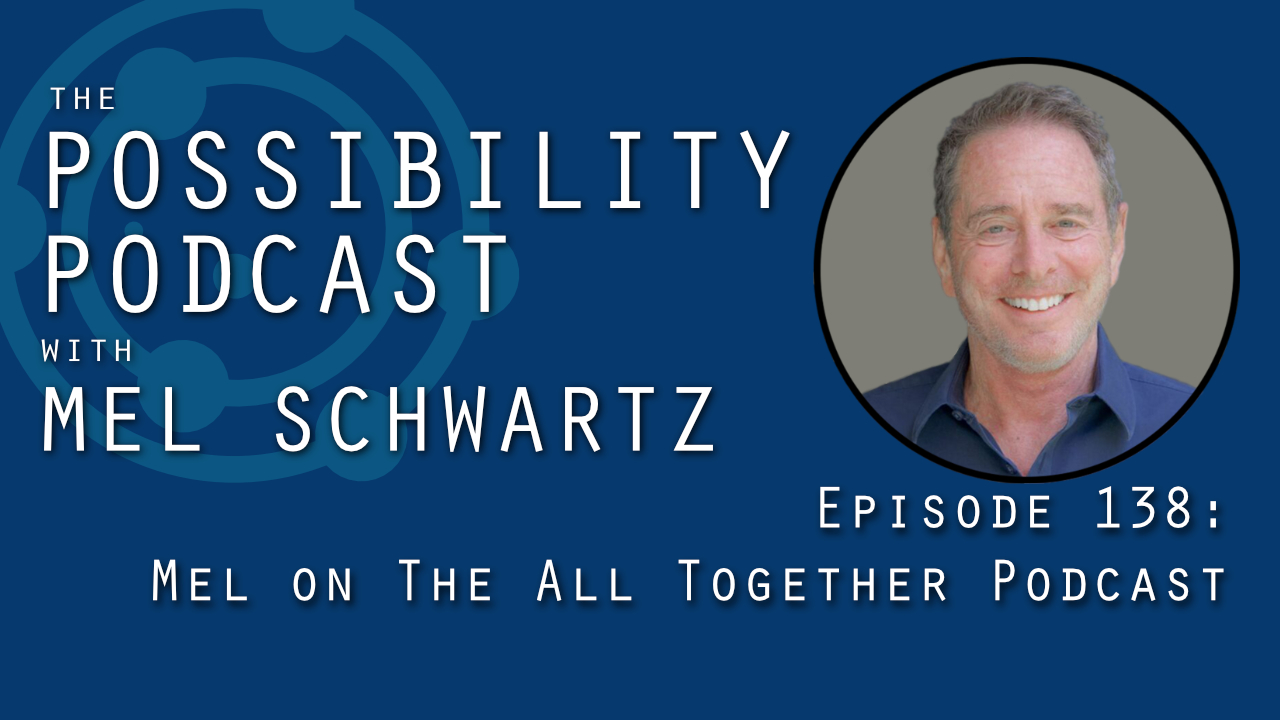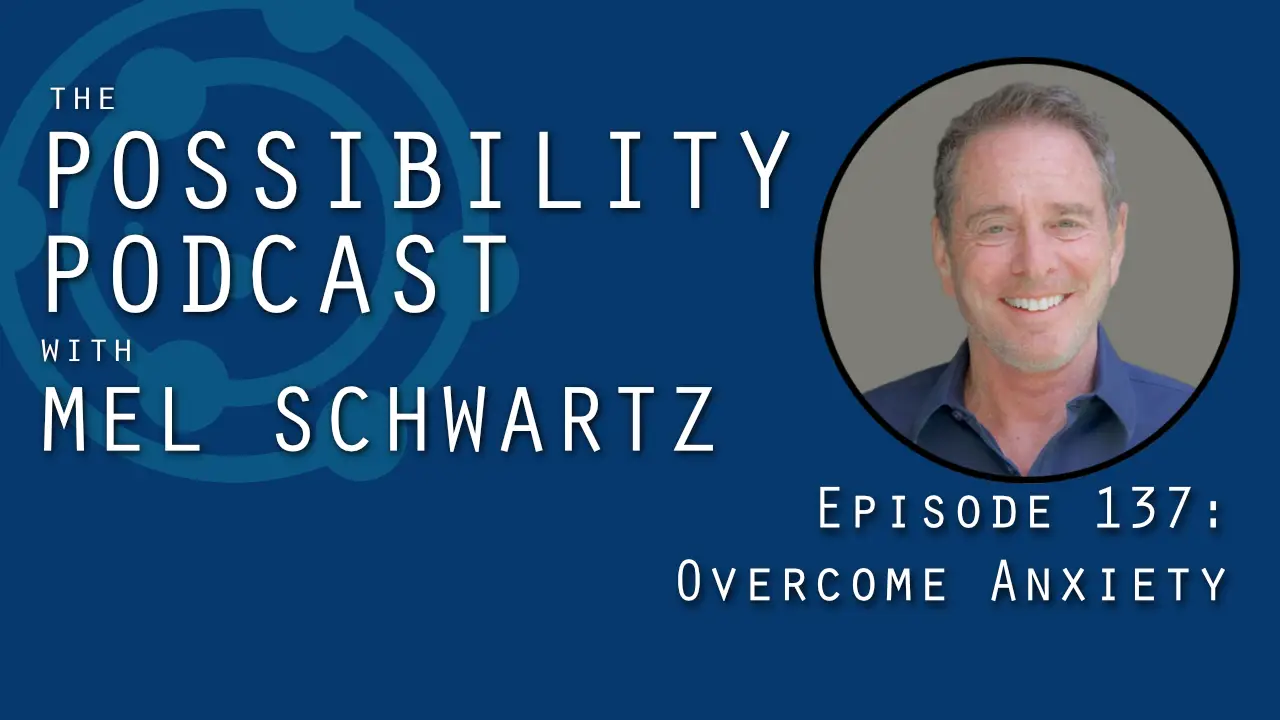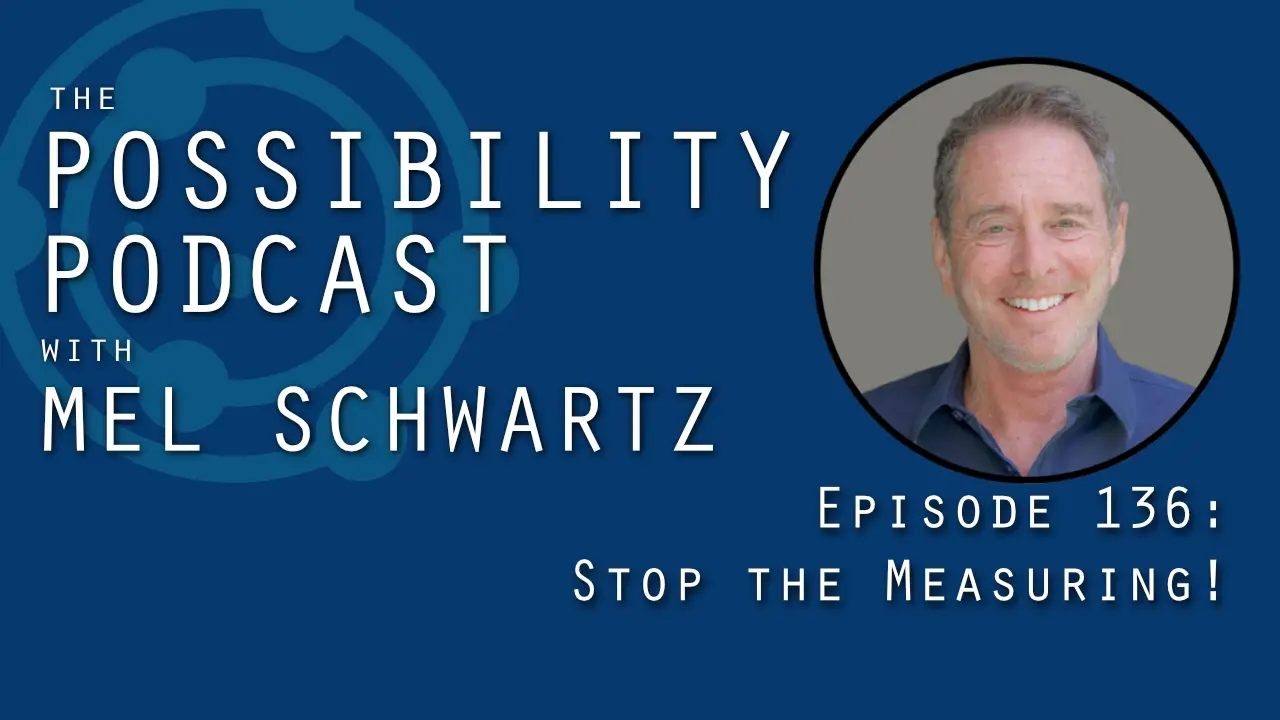Podcast: Play in new window | Download
In The Possibility Podcast with Mel Schwartz number 77, I look at the placebo effect as a springboard to discussing the false duality of the mind-body connection.
Listen to discover…
Interested in bespoke marriage and relationship counseling from Mel Schwartz? Reach out!
- how the placebo effect is treated as less than the gift it is
- the origins of mind-body duality
- why psychosomatic effects point to a powerful tool for self-healing
- why we should not speak about a “mind-body connection”
Your mind and your body are not distinct and separate. Share your experiences with the placebo effect and psychosomatic effects… in the comments!
Subscribe to The Possibility Podcast with Mel Schwartz
Don’t miss a single Possibility Podcast with Mel Schwartz! Subscribe for free in iTunes / Apple Podcasts, YouTube, Spotify, RadioPublic, Spreaker, or wherever you listen to podcasts. Or, simply copy / paste the RSS link directly into the podcast app of your choice!
Please Rate and Review
If you enjoy The Possibility Podcast with Mel Schwartz, please take a moment to rate and review the show in iTunes / Apple Podcasts or Podchaser. It only takes a few minutes, and adding your review is as easy as clicking this link.
Your rating and review helps raise the visibility of The Possibility Podcast with Mel Schwartz, especially on iTunes / Apple Podcasts, which is one of the biggest podcasting platforms today. More visibility for the show means more listeners… and that growth means the show reaches — and helps — more people like you.
Thank you!
Talk With Mel!
Help others when Mel helps you: Contact Mel and find out how you can be a caller on the show and ask Mel a question. He’ll put the Possibility Principle to work for you, and your conversation will be recorded for use in a future episode of the podcast so other listeners can benefit.
Transcript of The Possibility Podcast with Mel Schwartz #077
Hello everybody, and welcome to The Possibility Podcast. I’m your host, Mel Schwartz. I practice psychotherapy and marriage counselling, and I am the author of The Possibility Principle , the inspiration and the companion to this podcast.
I’ll be introducing you to new ways of thinking, a new philosophy and a new game plan for life, and all of the infinite possibilities that await you.
Hello everybody and welcome to today’s episode of the Possibility Podcast. I’m going to entitle today’s conversation, “It’s ‘Just’ In Your Head,” and picture word “just” in quotation marks.
How did I come to this subject? A National Geographic article just recently caught my attention. The title of the article was, “Is Pain Relief from Marijuana Just in Your Head?”
It might have been your good fortune that you were not anywhere near me when I read that title, because I started talking to myself, muttering and exclaiming around this concept, this question, “is it just a placebo effect?” That is such a thoughtless way of looking at things.
Let’s begin by talking about placebo effect. The dictionary defines it as this:
“A beneficial effect produced by a placebo drug or treatment, which cannot be attributed to the properties of the placebo itself and must therefore be due to the patient’s belief in that treatment.”
Let’s put into simple English. You’re given a pill which you believe is a medication to treat some pain or medical condition you have. Unbeknownst to you, that pill is a blank. There’s nothing inside the capsule. It’s simply a placebo. It’s suggesting to you that it will work but there’s no medication. And yet astounding percentage of the time placebos can be as effective as the actual drug itself. So instead of it’s just a placebo effect, why aren’t we saying wait a minute! Wow! Holy shit!
So the mind can heal the body. Why would we say “just” a placebo effect instead of looking at this incredible sense of wonderment that the mind, our thoughts, consciousness might have the ability to heal illness and overcome pain? Why are we marginalizing this? Why are we treating it as an anomaly?
You know, good science, and good medicine when it comes across one anomaly, should cause it to stop and rethink its position and say one exception means that we need to go back to the drawing boards. So when we use the word that just that one, simple, word, marginalizes and blocks, our ability to seize a wonderful opportunity, which is the mind-body oneness.
Let’s take a look at how this mind and body disconnection began with the famous philosopher, Rene Descartes in the 17th century. He wrote five words, “I think, therefore I am.”
As incredible as it may seem those five words altered our perception of the relationship between mind and body. Those five words magically bifurcated, split in half mind and body and brainwashed us literally. So we amputated mind from body and this is a magic trick that Descartes committed with these five words and four centuries later, we are still succumbing to.
I’d love to show you my appreciation for your subscribing to and rating this podcast by offering you, a gift to one of the following:
The Power of Mind, a live talk that I gave. Or one of my digital ebooks: Creating Authentic Self Esteem, Overcoming Anxiety, or Raising Resilient Children, and lastly, Cultivating Resilient Relationships. Once you have subscribed, please send an email to mel at mel schwartz dot com and just let me know which gift you prefer. Thanks.
So this is called a Cartesian Duality. Cartesian coming from the name, Descartes. Duality, that mind and body are separate.
There’s a concept you may’ve heard me speak of another occasions called reification. Reification is our my mind or our thoughts, make something up, explain something or have an insight and we then begin to think of what our mind made up as real. So Descartes’ mind came up with “I think, therefore I am,” and for four centuries, we’ve operated under the powerfully mistaken duality that mind and body are separate, with just unimaginable consequences. This all speaks to a macro issue which I call the Illusion of Separation which I’m going to get back into in just a little bit.
So, in this illusion of separation, mental activity is in your head and the body is somehow cordoned off. You know, the best explanation I have of this is think about men wearing neckties. That tie literally metaphorically severs the mind, and the body. At any rate, this results in this mind body disconnection, which causes us unimaginable and immeasurable harm. So Descartes’ thought, severed mind and body and we’ve been brainwashed by this paradigm of separation. Again, amputating mind from body is so much more.
This all creates what I call fragmented thinking. Thinking that only sees separated parts that our mind separated. Arguably. this is the biggest problem in the world today. Most of our challenges struggles disasters, come from fragmented thinking not seeing in wholeness.
Now, quantum physics, as you’ve heard me recount many times, is proven inseparability. That reality appears to be one inseparable whole. I on occasion have said, “There’s no Mind-Body Connection,” and what I’m getting at, is that the word connection becomes invalid, a bridge connects two different bodies of land. It’s a connected to things that may have some separation, but mind and body were never separate, so we should never speak of Mind-Body Connection.
Mind and body are simply differing aspects of the same whole. We should never think of them separate. In that case, this concept of it’s just in your head is mesmerizing us, pun intended when I call it a slight of mind, rather than a slight of hand.
So, let’s turn now to the word psychosomatic. Dictionary again, speaks of psychosomatic as:
Of, relating to, or concerned with bodily symptoms caused by emotional or mental disturbance.
The word psychosomatic is used is a pejorative, culturally. It’s all in your head, it’s psychosomatic. It’s just in your head. Well would these mental or emotional disturbances be less significant if they were caused by the body? Look at the panic attack. Panic attack is caused by your nervous system in the state of agitation. But the panic attack is physical. What’s in your mind impacts your body. What is in your body impacts your mind. The word psychosomatic was created to reconnect what Descartes severed, but it did it in a marginalizing, way. It discovers a connection between mind and body, but it does so judgmentally. Again, severing oneness.
So let me ask this question: if we meditate and it lowers our pulse rate and our blood pressure is meditating psychosomatic? We use the word psychosomatic on the in the negative and pejorative way.
We have to ask ourselves, wouldn’t prolonged fear, and anxiety, impact our physical being? Even the traditional medical establishment speaks to his injurious stress is for our physical health.
Here is how we need to think: If my mind has the ability to improve and benefit my physical being, why not study and encourage this infinite tool, the power of the mind, to heal my body, my mind and my soul? That’s the power of our mind. We need to not marginalize it, but embrace it, our mental emotional and physical claims, all interpenetrate, one, another, they are differing aspects of our total being. Your mind and your thoughts impact your body. They are part of your body. So again, if meditation lowers your pulse, how can it be just in your head? And anger will quicken your pulse.
And by the way, we understand that exercise impacts our minds. Who this is not one directional. We need to stop clinging to the insanity of seventeenth-century thinking.
Now of course traditional medical establishment and the profit motive of the pharmaceutical industry with incline us to continue to think toward that my mind body duality because once we take advantage of mind healing us, there going to be a lot less dollars spent on drugs. But think of it this way, if the universe is inseparable, if reality appears to be unbroken wholeness, what sense could make for mind and body to be an exception? Again, placebo, what we believe informs us is what we feel and experience. This impacts everything. The placebo should open us up to the idea of our mind is the metaverse.
See, mind is more than your brain. It’s consciousness. If my consciousness is loving, will that impact how I see myself and others? Of course! Consciousness is supremely powerful. Let’s harness our consciousness and at least begin by restoring our mind-body wholeness.
Your mind is consciousness and your body is consciousness. Arguably everything is consciousness. Don’t splinter and fragment wholeness. Embrace wholeness and you’ll experience your life on an altogether different l evel, and don’t any longer believe the concept or the term, “It’s just in your head.” That is simply moronic.
Well, I hope you enjoyed today’s episode. It was exciting for me to share this with you. I’m sure many of you are well along this path way. I just wanted to further that exploration. Until we meet again, be well, be healthy and be safe, and bye for now.
I hope you enjoyed this episode of The Possibility Podcast, and I welcome your feedback on this or any episode. Please send me an email at mel at mel schwartz dot com, or leave a comment in the show notes for this episode at melschwartz.com.
If you like what you’re hearing, please take a moment to rate and review the show at Apple Podcasts, Spotify, or wherever you get your podcasts. Your reviews really help boost the visibility for the show, and it’s a great way for you to show your support.
Finally, please make sure to subscribe to The Possibility Podcast wherever you get your podcasts, and that way you’ll never miss an episode.
And thanks again, and please remember to always welcome uncertainty into your life as you embrace new possibilities.





I LOVE your insight into this “mind-body connection”! I wrote a paper in college having to do with this very topic. I guess I was not aware that Descartes’ 5-word statement was a DISconnection as I always understood the connection well enough. I saw it AS a connection. However, when people say, “It’s just in your head,” they are NOT understanding that EVERYthing is “in your head” as it all BEGINS in the mind! And from there, the effect is virtually immediate ON THE BODY!
I am going to share this podcast link to encourage others and to support my own stance as being quite viable. Thanks again Mel for all your wisdom and enrichment!
Thanks so much for sharing your thoughts Debi! Where are
you located?
It’s never “just in your head.” Such an interesting concept. I can definitely relate to how prolonged fear and anxiety impacts physical health. Look at the person who is in a constant state of panic. You’ll also find this person can suffer from electrical changes in the heart, palpitations, ulcers, sweating, you name it. (I am living proof of this!)
Interesting what you mention about panic attacks. As someone who has had many of these, I find it intriguing that you bring up how the mind and body work together during an attack. A combination of nervous system dysfunction and thoughts. I never considered looking at panic attacks through this lens of thinking.
Great episode. I really enjoyed this one, Mel!
Hi Liz, thanks so much for your insightful comments